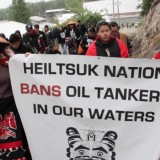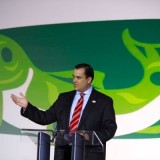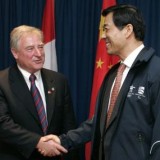I recently attended the one-day hearing for the Joint Review Panel into the proposed Enbridge Northern Gateway Pipeline in the small community of Shearwater – the umpteenth meeting of this sort I’ve documented over the past 6 years covering environmental politics in BC. At the end of the meeting, throughout which I recorded the continued disrespect of the public and Heiltsuk First Nations people – in whose traditional territory the meeting took place – by the National Energy Board panel running the show, I was assaulted by panel staff. But we’ll get to that in a moment.
Listen to exclusive audio from the July 27 Enbridge hearing and Damien’s interview with Rae Kornberger of CHLY 101.7 FM in Nanaimo on the Bella Bella and Shearwater hearings:
First, a little background. The July 27 meeting was a make-up for the lost day of hearings in nearby Bella Bella this past April, which I also documented thoroughly in these pages and through the national mainstream media. I was, in fact, essentially the only media in attendance at that hearing. I helped, along with a small team of terrific people from the Heiltsuk Nation, to correct the record when the panel attempted to cancel the whole week of scheduled testimony over bogus insinuations that a peaceful greeting at the airport, largely by schoolchildren, First Nations chiefs and elders in regalia, turned violent.
Representatives of the panel implied the group was an unruly mob that threatened the very safety of the panel. As our footage clearly displayed on everything from CBC’s The National to Global TV and CTV, the reality was nothing of the sort.
The RCMP, who were supervising the whole thing, later put out a statement affirming it was indeed a “peaceful demonstration and there were no incidents to report.” Yet within a few hours of Sunday’s greeting at the airport, the panel had sent an email to the band’s chief, Marilyn Slett, informing her they were cancelling the week’s hearings.
By Monday afternoon, however, following a barrage of provincial and national media stories which scoffed at the panel’s story, the hearings were back on. No apology, of course, and the story had changed – now it was simply a matter of “logistical difficulties”, a bold-faced lie given the email they sent to the chief, which stated: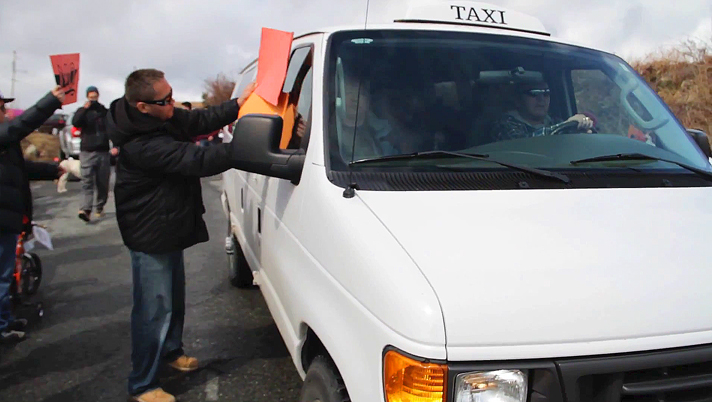
The panel cannot be in a situation where it is unsure whether the crowd will be peaceful…Based on our experiences this afternoon, the panel is concerned that a meaningful hearing cannot be achieved.
The Heiltsuk went on to acquit themselves brilliantly at the reinstated hearings, in spite of the atmosphere of disrespect they were forced to operate within in their own territory – producing speech after speech of powerful material for the panel to consider, such as the testimony of young William Housty or this compilation of statements.
That brings us to July 27 – a day of testimony to make up for the lost hearings the last time around. Only, this meeting was held in the largely non-aboriginal community of Shearwater, across the water from Bella Bella, in a hall not nearly big enough to accommodate the community that wished to attend. Nor was it easy for media to reach – only myself, Kai Nagata of The Tyee, and perhaps one print journalist managed to make it.
None of this was surprising, based on my experiences with the panel to date, nor was their lack of contrition for their appalling behaviour in April, or their continued rudeness and adherence to invented, stifling protocols.
At one point, panel member Kenneth Bateman cut off Ingmar Lee of Shearwater, mid-testimony, issuing the following lecture:
This is not an opportunity to provide a personal political statement or to make disparaging remarks of any party. We want this to be respectful of all parties. It also needs to relate directly to the project and not to Canadian affairs at broad…I will stop you if you continue in the vein that you have because it is not consistent with the respectful approach that we have taken and have require from all parties.
Listen to the back-and-forth between presenter Ingmar Lee and panel member Kenneth Bateman:
Just how respectfully does this bunch conduct itself? At meeting’s conclusion, the panelists leapt from their seats and darted out the back door. When I pursued them with my camera to capture their escape, I was immediately physically obstructed by two unidentified panel staff, knocking the microphone off my camera in the process. I was told by a woman who refused to identify herself to me but whom I was later informed provided “secretarial services to the panel” that I had “crossed the line” – evidently an invisible one somewhere near the front of the room, of which I was never informed.
We can argue about who crossed what line.
I chose not to take any action, even though the incident occurred in full view of the audience and a local citizen journalist with another camera and despite the platoon of police officers stationed outside the venue – I have more important things to focus my energies on. I did, however, take the opportunity to speak to the panel’s facilitator, Ruth Mills, telling her that in all my years of documenting these sorts of processes, this panel has conducted itself with less class than any I’ve witnessed.
The whole Enbridge JRP process has been a farce, especially given Prime Minister Harper’s position that he will push the pipeline through even if the panel rules against it.
Yet in spite of the obvious futility of the process, I’ve had the great privilege to witness and document moving testimony from British Columbians and First Nations, which has given me a whole new appreciation for this land and its people – and a much deeper understanding of the history of our province and nation. And for that, it has proven an immensely rewarding experience.
I don’t think it’s a stretch to say that I’ve documented more environmental assessment meetings, judicial inquiries, and “public” open houses relating to industrial projects throughout this province over the past five or six years than anyone – so these Enbridge hearings call to mind a number of similarly negative experiences. I will relate just a select few below.
To borrow a line from my colleague Rafe Mair, “I’d rather have a root canal without anaesthetic than attend another one of these things.” But I believe someone needs to do it.
The Cohen Inquiry into Disappearing Fraser Sockeye
At the Cohen Commission last year, I, along with all other media, was forbidden from bringing a camera into the proceedings. On some days, there was one camera permitted to a gentleman working on a documentary – that being connected to a video feed in a separate media room. I was initially granted access to this room by the the Inquiry’s media liaison, Carla Shore, but told I couldn’t patch into the video feed because the 30-year old beta deck had been rented by the CBC and I did not have their permission to use it. I gladly offered to: A. pay for my use of the machine; B. provide my own machine; C. contact the CBC and obtain permission from them to use their equipment. None of these was acceptable to her.
Fed up with this runaround, I plugged a video recorder into the deck, thus unleashing the fury of Ms. Shore. Little did she know, the recorder for the livestream audio feed, due to technical issues, had been placed directly in front of a small speaker inside the media room which was playing the audio from the hearings. That meant the microphone would pick up any noise in the room and stream it live on the Commission’s website, along with the testimony inside.
I was later told by a number of people who were listening to the livestream that they figured a riot had broken out right in the midst of the Cohen Inquiry.
Listen to Damien’s run-in with media liaison Carla Shore at the Cohen Commission last September:
Having later discovered the whole thing had been inadvertently captured, Ms. Shore sheepishly apologized to me for the incident and revoked the ban she had since instated on my use of the media room.
In the end, it emerged through our conversations that the reason she was so obstructive towards me was that she’d read my editorial earlier that morning and deemed me to be too opinionated, thus disqualifying me as a journalist.
I reminded her that my publication had produced a significant amount of well-read coverage on the Cohen Inquiry, that my colleague Rafe Mair was in the Canadian Association of Broadcasters’ Hall of Fame and had won every major journalistic award in the country, and that together we had likely done more to document the salmon farming industry and salmon issues in general than any media team in BC over the past decade…and yet, somehow, this one woman’s arbitrary opinion as to the worthiness of my credentials impeded my ability to report on a “public” Judicial Inquiry of enormous import.
Private River Power Environmental Assessment Hearings
Rafe and I have had far too many run-ins with the “run of river” assessment people over the years to mention. Suffice it to say, the entire process has been an affront to the public interest. Not one meeting is designed to hear whether citizens want these projects, and when a speaker goes there, they are promptly ruled out of order. The companies clearly control the process, choosing the most out-of-the-way, inconvenient locations and times for the meetings.
On several occasions, this blew up in their face – such as the famous Pitt River meeting where so many people crammed into a tiny room the proponent had booked that the fire marshal had to be called and the meeting rescheduled to a much larger venue. This was again packed – this time with 1,400 people – and the day after, the project was essentially killed.
The same thing happened in the tiny town of Kaslo (pop. 1,000), where 1,100 people turned out to oppose the Glacier-Howser projects in the Kootenays. They had to take over the meeting from the proponent – who was intent on wasting everyone’s time with a half-hour, glossy powerpoint – and one-by-one they delivered the message that this thing was not going to happen.
But my most heated private power run-ins involved GE’s proposed Bute Inlet mega-project, particularly with the head of the Canadian Environmental Assessment team there, Ms. Kathy Eichenburger. Needless to say, Kathy and I got off to a rocky start when she insisted I not film the first round of proceedings in Powell River. I held my ground after 4 or 5 attempts by different staff to convince me to stow my camera. Rafe got in trouble once or twice too for his less-than-diplomatic language, as I recall.
Then, in Campbell River, Ms. Eichenburger continued to overlook me as a speaker, as I waited to voice my concerns about the project. In a side bar, she told me that since I’d spoken already in Powell River, I wouldn’t be getting a turn tonight. I informed her that Campbell River was my hometown, that I’d traveled a whole day to be there and I was bloody well going to say my piece, even if that meant grabbing the microphone off its stand. To which she threatened she would call the police on me. To which I quoted Clint Eastwood.
Needless to say, I got my turn at the microphone and also fully documented both hearings, produced a short documentary on the project and continued to work with Rafe and many others to see it shelved, where it thankfully remains (though not certainly forevermore).
This is just a small sampling of the many colourful experiences I’ve had with these “public” meetings deciding the fate of our public resources.
Neither Rafe nor I are reporters; and we are only “journalists” if you accept Mike Smyth or Vaughn Palmer or Barbara Yaffe or any other editorialist as a journalist. We are in the business of expressing ourselves and the views of others, where it regards the environment and public interest in Canada, and particularly BC. We strive, above all, to get to the bottom of and speak the truth about these largely destructive projects. 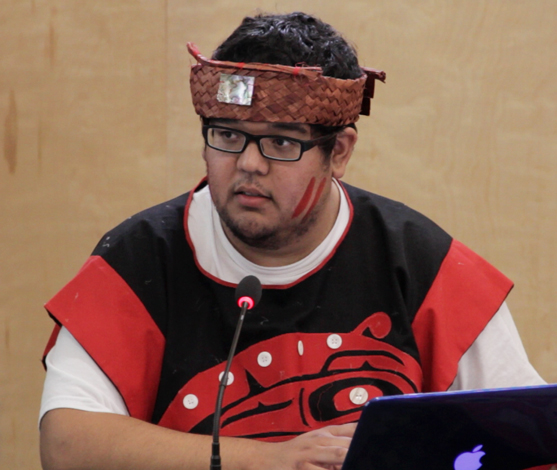
In the course of our work around these meetings, we have found ourselves deeply frustrated by the process, for the above reasons. But these events are scarcely a waste of time – on the contrary, they have proven to be a focal point in the battle over our precious resources, even our very democracy. And so Rafe and I go to them – and we will not be told what to report on, how to go about it, nor how to express or not express ourselves at the microphone.
In all my days of witnessing these farcical stage-plays that masquerade as “public” hearings, The Enbridge JRP takes the cake. As I told the panel’s facilitator after my run-in with her team, the harder you try to impede the public will, the ruder you are to the citizens and First Nations of this province, the more you help their cause.
So, by all means, keep it up.
And remember, you’re on candid camera.
